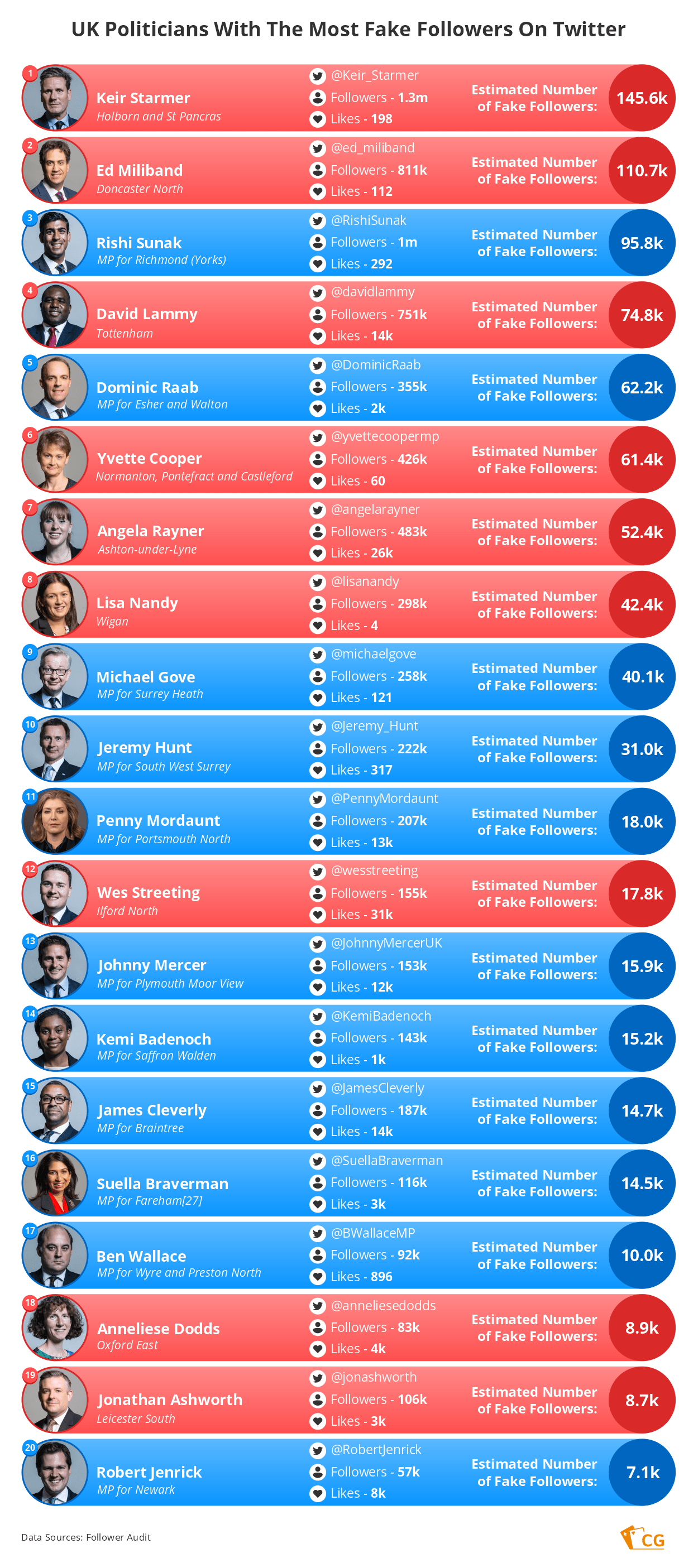The Shocking Truth About Fake Followers on UK Politicians’ Twitter Accounts: An Unfair Advantage
Twitter has become one of the primary platforms for politicians to connect with their constituents and promote their political views. However, not all the followers on these politicians’ Twitter accounts are genuine. In recent years, the issue of fake followers has become increasingly prevalent on social media platforms, and this is no different for UK politicians. In this blog post, we will explore the extent of fake followers on the Twitter accounts of the Labour Shadow Cabinet and the Conservative Cabinet.
In the world of UK politics, social media has become a battleground for politicians looking to gain an edge over their opponents. With Twitter being one of the most popular platforms, it’s no surprise that politicians are using it to showcase their work, engage with the public, and build their personal brand. However, with the rise of fake followers, the playing field is no longer level, and the disparity between the Labour Party and the Conservative Party is a stark reminder of this.
CasinoGuardian did a study examining the Twitter accounts of all those that had one in the Cabinet and Shadow Cabinet. The data was gathered by analysing the followers of the 59 UK politicians’ Twitter accounts in the Labour and Conservative Cabinets, and identifying the percentage of fake followers in each account. We took a look at some of the UK’s most prominent political figures, including PM Rishi Sunak and Labour leader Keir Starmer .
The results are a cause for concern. From the pool of Twitter accounts we analysed, the study found that the average percentage of fake followers on UK politicians’ Twitter accounts is, on average, 9.76%. This means that nearly one in ten followers on UK politicians’ Twitter accounts are fake, artificially boosting their reach and influence.
Conservative Cabinet
The Conservative Cabinet is made up of the members of the ruling Conservative Party who hold various portfolios in the UK government. We analysed the Twitter accounts of 20 members of the Conservative Cabinet and found that the average fake followers percentage is 10.16%. Some of the politicians with the highest percentage of fake followers include Deputy Prime Minister Dominic Raab (@DominicRaab) with 17.50% and Secretary of State for Levelling Up, Housing and Communities Michael Gove (@michaelgove) with 15.56%.
Labour Shadow Cabinet
The Labour Shadow Cabinet is made up of prominent members of the Labour Party who serve as the main opposition to the ruling Conservative Party. We analysed the Twitter accounts of 29 members of the Shadow Cabinet and found that the average fake followers percentage is 9.37%. Some of the politicians with the highest percentage of fake followers include Shadow Home Secretary Yvette Cooper (@yvettecoopermp) with 14.40% and Shadow Secretary of State for Climate Change and Net Zero Ed Miliband (@ed_miliband) with 13.64%. On the other hand, Shadow Chief Secretary to the Treasury Pat McFadden (@patmcfaddenmp) has the lowest percentage of fake followers at 1.46%.

Whilst it might be comforting to note that a higher number of followers or likes might correlate with a higher number of fake followers, for the most part, this simply isn’t true. At the higher end, this may seem to be the case, but the data as a whole tells us that there is no direct correlation between the level of followers and fake followers. While some politicians have a higher percentage of fake followers than others, the disparity between the Labour Party and the Conservative Party is barely there. On average, politicians from the Conservative Party have only 0.55% more fake followers than those from the Labour Party.
This disparity in the authenticity of engagement that UK politicians receive on their Twitter accounts highlights the need for greater transparency and accountability. The impact of fake followers on UK politics is substantial and undermines the credibility of politicians and their reach. It creates an unequal playing field for political representation, as politicians with a higher percentage of fake followers are seen as having more influence and reach, even though it is not based on genuine engagement.
The issue of fake followers must be addressed by politicians and political parties, to maintain the public’s trust in the political process and ensure the authenticity of political representation. The rise of fake followers on UK politicians’ Twitter accounts is a concerning trend that undermines the credibility of political representation. The impact of fake followers on UK politics highlights the need for greater transparency and accountability in social media engagement, to ensure that politicians are communicating with the public in an authentic and genuine manner.
It is evident that the issue of fake followers is prevalent on the Twitter accounts of UK politicians. From our analysis, it is clear that both the Labour Shadow Cabinet and the Conservative Cabinet have an average of fake followers that is concerning. It is imperative for politicians to be transparent about the sources of their followers, as fake followers can be used to manipulate public opinion and distort political discourse. The issue of fake followers is not limited to the UK and is a problem faced by politicians globally. Therefore, social media platforms must take steps to tackle this problem, and politicians must be more vigilant in ensuring that their followers are genuine.
